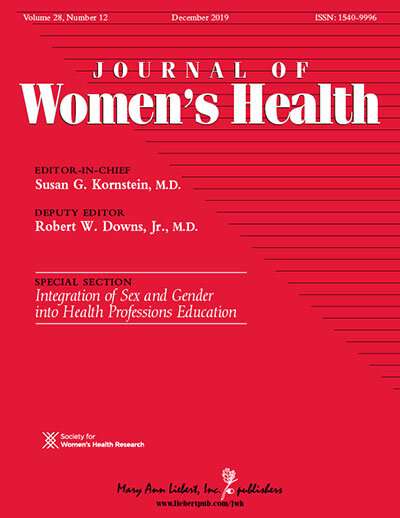Credit: Mary Ann Liebert, Inc.,publishers
Not only is excessive gestational weight gain (GWG) associated with increased long-term maternal weight, but a new study has shown that there is a cumulative effect of excessive GWG over multiple pregnancies. The study, which analyzed the effect of the number of excessive GWG pregnancies on body mass index (BMI) at midlife, is published in Journal of Women's Health.
"The Effect of Gestational Weight Gain Across Reproductive History on Maternal Body Mass Index in Midlife: The Study of Women's Health Across the Nation" was conducted by Franya Hutchins, MS, School of Public Health, University of Pittsburgh (PA), and coauthors from University of Pittsburgh, University of California (Berkeley), University of Massachusetts Medical School (Worcester), and Kaiser Permanente (Oakland, CA).
The researchers found that each additional pregnancy with excessive GWG was associated with a higher BMI among women ages 42-53. Overall, nearly 40% of women reported a GWG that was higher than the recommended GWG in at least one pregnancy. Almost half (47.6%) of the women with excessive GWG in at least one pregnancy had an obese BMI at midlife, compared to 22.9% of those who had never experienced excessive GWG.
Susan G. Kornstein, MD, Editor-in-Chief of Journal of Women's Health and Executive Director of the Virginia Commonwealth University Institute for Women's Health, Richmond, VA, states: "Hutchins et al. showed that each pregnancy with excessive GWG was associated with a 64% increase in the likelihood of obesity at midlife, regardless of race/ethnicity, number of pregnancies, and physical activity level. This finding makes a strong argument for avoiding excessive gestational weight gain in any pregnancy."
More information: Franya Hutchins et al, The Effect of Gestational Weight Gain Across Reproductive History on Maternal Body Mass Index in Midlife: The Study of Women's Health Across the Nation, Journal of Women's Health (2019). DOI: 10.1089/jwh.2019.7839
Journal information: Journal of Women's Health
Provided by Mary Ann Liebert, Inc
























